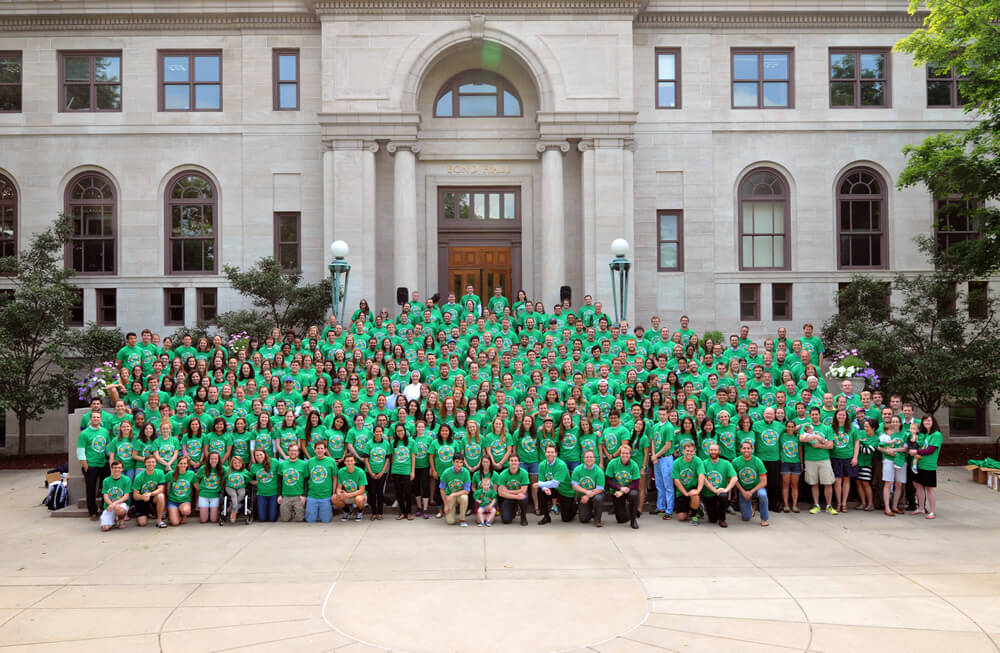History
-
Humble Beginnings
Rev. Timothy R. Scully, C.S.C, and Rev. Sean McGraw, C.S.C., co-founded the Alliance for Catholic Education in 1993 to address the need for talented, faith-filled teachers in Catholic schools. By forming a new generation of energetic and committed Catholic school teachers, ACE sought to sustain and strengthen Catholic education, especially in under-resourced schools in the South.
-
ACE Teaching Fellows
As a first step toward achieving these goals, ACE Teaching Fellows was launched. Best known for its innovative method of formation, ACE has sent forth recent college graduates with strong backgrounds in diverse academic disciplines to serve marginalized children in Catholic schools across the country. Since it's founding, ACE has formed nearly 1,500 teachers throughout the United States. Today, 76% of ACE Teaching Fellows graduates continue to serve in the field of education, the majority in Catholic schools.
-
Remick Leadership Program
While ACE began as a response to a manifest need in many (arch)dioceses for teachers in under-resourced schools, it's second formation program was born out of the acute need for well-formed Catholic school principals. In 2002, ACE founded the Mary Ann Remick Leadership Program to form transformational school leaders. It has since become the largest of its kind in the United States, having formed more than 260 school leaders who now serve Catholic schools in 41 states and 65 dioceses.
-
Addressing a National Need
By 2005, it became clear that a more comprehensive approach to sustaining and strengthening Catholic schools would be necessary to revitalize and transform the largest private school system in the world. In response to the United States Conference of Catholic Bishops' call for Catholic higher education to help address the future of elementary and secondary Catholic schools, Notre Dame convened a national Task Force on Catholic Education to study and discuss the issues affecting our nation's Catholic schools.
After fourteen months of rigorous study and meetings, the Task Force released its final report in December 2006, entitled
Making God Known, Loved and Served: The Future of Catholic Primary and Secondary Schools in the Untied States. The report outlined twelve strategic objectives for the University of Notre Dame to help meet the most pressing needs of our nation's elementary and secondary Catholic schools, along with five additional recommendations for the Church in the United States to ensure the vitality of Catholic schools in the new millennium.
-
ACE Today
Today, the Alliance for Catholic Education comprises a dozen initiatives that seek to form the next generation of teachers and leaders, to establish networks to extend the Catholic school advantage to thousands of new families, and to strengthen Catholic schools and give disadvantaged children the opportunities they need and deserve.
As a first step toward achieving these goals, ACE Teaching Fellows was launched. Best known for its innovative method of formation, ACE has sent forth recent college graduates with strong backgrounds in diverse academic disciplines to serve marginalized children in Catholic schools across the country. Since it's founding, ACE has formed nearly 1,500 teachers throughout the United States. Today, 76% of ACE Teaching Fellows graduates continue to serve in the field of education, the majority in Catholic schools.
While ACE began as a response to a manifest need in many (arch)dioceses for teachers in under-resourced schools, it's second formation program was born out of the acute need for well-formed Catholic school principals. In 2002, ACE founded the Mary Ann Remick Leadership Program to form transformational school leaders. It has since become the largest of its kind in the United States, having formed more than 260 school leaders who now serve Catholic schools in 41 states and 65 dioceses.
By 2005, it became clear that a more comprehensive approach to sustaining and strengthening Catholic schools would be necessary to revitalize and transform the largest private school system in the world. In response to the United States Conference of Catholic Bishops' call for Catholic higher education to help address the future of elementary and secondary Catholic schools, Notre Dame convened a national Task Force on Catholic Education to study and discuss the issues affecting our nation's Catholic schools.
After fourteen months of rigorous study and meetings, the Task Force released its final report in December 2006, entitled Making God Known, Loved and Served: The Future of Catholic Primary and Secondary Schools in the Untied States. The report outlined twelve strategic objectives for the University of Notre Dame to help meet the most pressing needs of our nation's elementary and secondary Catholic schools, along with five additional recommendations for the Church in the United States to ensure the vitality of Catholic schools in the new millennium.
In response to the outlined objectives in the report, ACE's scope and size expanded quickly. Today, the Alliance for Catholic Education comprises a dozen initiatives that seek to form the next generation of teachers and leaders, to establish networks to extend the Catholic school advantage to thousands of new families, and to strengthen Catholic schools and give disadvantaged children the opportunities they need and deserve.






